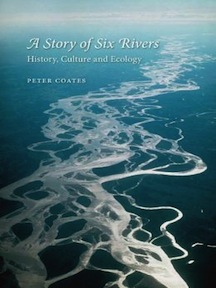By David L. Kirchman
Two of the six rivers, the Danube and the Yukon, discussed in this book are not surprising choices, but the other four, the Spree, Po, Mersey, and the Los Angeles River, need some explaining. Peter Coates, a professor of American and environmental history at the University of Bristol, does that in the first chapter of this eclectic mixture of history and environmental science. He picked rivers big enough to be meaningful while avoiding the well chronicled, the “national rivers” like the Mississippi, Thames, or Rhine. He also mostly avoids grand themes and sweeping generalizations. The end result is sometimes the arcane of academia, but more often Coates tells interesting stories about the Europeans and European Americans living on the banks or navigating the waters of the six rivers.
The book is a fluvio-centric view of history. The Danube has seen its share of it, from bridge-building Romans to the Balkan wars and the pollution caused by the NATO 78 day bombing campaign in 1999. Rather than blue, Coates points out that red is a more accurate color for the Danube, given the bloody warfare waged along the river by Ottoman, Napoleonic, and Habsburg empires in addition to the Romans. The latest empire, the Third Reich, used the Danube as a “liquid dumping ground” for massacred Jews and Serbs during the last years of World War II. The Spree River also has a violent past when it was part of the Wall separating East from West Berlin. East Germans escaping to the West were not safe from being shot or drown until they reached the west bank because the waters of the Spree were considered part of the East.
There are more bucolic stories here. The grandeur of the Yukon was evident to early explorers long before it was re-discovered by ecotourists and later-day homesteaders. Even the Danube, serving as a natural waterpark for Vienna, has its green side. One hundred kilometers southeast of Berlin is Spreewald where the Spree River splits into a maze of smaller rivers and wooded wetlands, an escape for urbanites from Dresden as well as Berlin. The Po River is not a commercial conduit like the Danube, but its fluvial flavored terroir is home to some of Italy’s most renowned foods including gorgonzola and parmesan cheeses, and prosciutto di Parma. The Spree can claim a pickle.
The rivers are not passive characters in these stories and histories. Floods, erosion, and shifting riverbeds have troubled cities since their founding on the banks of these rivers. Coates sums up society’s response by quoting the Roman orator Marcus Tullius Cicero from the first century BC: “We confine rivers, we straighten their course, we divert them altogether.” Or so we try, often with unforeseen consequences. On the Po River the Romans were among the first to maximize value (wanted water) and minimize danger (unwanted water), as Coates puts it. But the prize for the most regulated river must go to the Los Angeles River. In an effort to control precipitous floods from rain in mountains surrounding Los Angeles, about 60 percent of the bottom of this erstwhile river has been paved. Its concrete riverbed was driven on by John Travolta in Grease and Arnold Schwarzenegger in Terminator 2 among others.
Coates handles the Los Angeles with as much affection and care as the Mersey River, the river of his boyhood. The Mersey is in this book because of the city, Liverpool, at its mouth. Like the other rivers in the book, except for the Yukon, the Mersey was a sewer pipe for textile and soap factories in the nineteenth century and petrochemical plants in the twentieth. Now it is once again home to cormorants and salmon. Coates finds hope even in the Los Angeles River as the city has already established a string of mini-parks along the river’s banks and has plans of bringing back steelhead trout, last caught near Glendale in 1940. As the book ends, Coates comments on the changing nature of rivers and history. The confluence of both is the story of the book.
David L. Kirchman (ΦBK, Lawrence University, 1976) is the Maxwell P. and Mildred H. Harrington Professor Marine Biosciences at the University of Delaware and a resident member of the Alpha of Delaware Chapter of Phi Beta Kappa.




